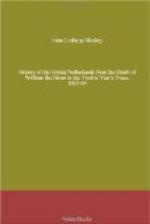Two thousand gowns, of the most, expensive material, adorned with gold, pearls, and other bravery—for Elizabeth was very generous to herself— were found in the queen’s wardrobe, after death. These magnificent and costly robes, not one of which had she vouchsafed to bestow upon or to bequeath to any of her ladies of honour, were now presented by her successor to a needy Scotch lord, who certainly did not intend to adorn his own person therewith. “The hat was ever held out,” said a splenetic observer, “and it was filled in overflowing measure by the new monarch.”
In a very short period he had given away—mainly to Scotchmen—at least two millions of crowns, in various articles of personal property. Yet England was very poor.
The empire, if so it could be called, hardly boasted a regular revenue of more than two millions of dollars a year; less than that of a fortunate individual or two, in our own epoch, both in Europe and America; and not one-fifth part of the contemporary income of France. The hundred thousand dollars of Scotland’s annual budget did not suffice to pay its expenses, and Ireland was a constant charge upon the imperial exchequer.
It is astounding, however, to reflect upon the pomp, extravagance, and inordinate pride which characterized the government and the court.
The expenses of James’s household were at least five hundred thousand crowns, or about one quarter of the whole revenue of the empire. Henry IV., with all his extravagance, did not spend more than one-tenth of the public income of France upon himself and his court.
Certainly if England were destined to grow great it would be in despite of its new monarch. Hating the People, most intolerant in religion, believing intensely in royal prerogative, thoroughly convinced of his regal as well as his personal infallibility, loathing that inductive method of thought which was already leading the English nation so proudly on the road of intellectual advancement, shrinking from the love of free inquiry, of free action, of daring adventure, which was to be the real informing spirit of the great British nation; abhorring the Puritans— that is to say, one-third of his subjects—in whose harsh, but lofty. nature he felt instinctively that popular freedom was enfolded—even as the overshadowing tree in the rigid husk—and sending them forth into the far distant wilderness to wrestle with wild beasts and with savages more ferocious than beasts; fearing and hating the Catholics as the sworn enemies of his realm; his race, and himself, trampling on them as much as he dared, forcing them into hypocrisy to save themselves from persecution or at least pecuniary ruin—if they would worship God according to their conscience; at deadly feud, therefore, on religious grounds, with much more than half his subjects—Puritans or Papists—and yet himself a Puritan in dogma and a Papist in Church government, if only the king could be pope; not knowing,




